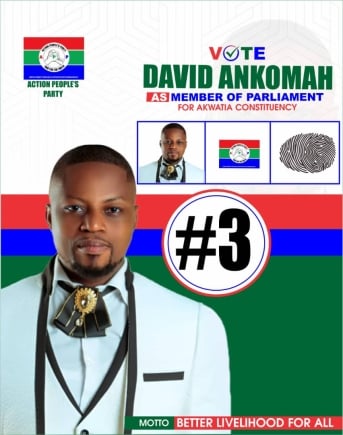The upcoming Akwatia by-election in Ghana has become the stage for a legal showdown between the Electoral Commission (EC) and David Ankomah, the parliamentary aspirant of the Action People’s Party (APP). The dispute centers on Mr. Ankomah’s disqualification by the EC for failing to submit a tax clearance certificate before the close of nominations. Mr. Ankomah has challenged this decision in the High Court, arguing that he was given insufficient notice to procure the certificate and that the EC’s action represents an arbitrary and unjust exercise of power, potentially tainted by malice and fraud. He has further requested an injunction to halt the by-election proceedings until the court resolves the dispute. This legal challenge has raised concerns about the balance between the EC’s authority to regulate elections and the rights of political participants, potentially setting a precedent for future electoral disputes.
The core of Mr. Ankomah’s argument rests on the assertion that the notification to produce the tax clearance certificate was delivered with such short notice that compliance was practically impossible. This, he contends, infringes upon the principles of fairness and natural justice, suggesting that the EC’s decision was not only procedurally flawed but also potentially driven by ulterior motives. By characterizing the EC’s action as “a wrongful administrative decision actuated by malice and fraud,” Mr. Ankomah implies a deliberate attempt to exclude him from the electoral process. This raises questions about the impartiality of the EC and its adherence to due process, casting a shadow over the integrity of the by-election.
The implications of this legal challenge extend beyond the immediate fate of Mr. Ankomah’s candidacy. The court’s ruling will likely serve as a litmus test for the EC’s authority in regulating elections and its obligation to ensure a fair and transparent electoral process. While the EC possesses the constitutional mandate to enforce nomination requirements, the court’s intervention could redefine the boundaries of this authority, particularly in cases where disqualifications are perceived as excessive or procedurally unfair. This could potentially impact the EC’s decision-making in future elections, necessitating a more cautious and transparent approach to candidate disqualifications.
The APP has rallied behind its candidate, framing the legal battle as a broader struggle against political exclusion and electoral injustice. The party views the outcome of this case as pivotal, not only for Mr. Ankomah’s political future but also for establishing a precedent that safeguards the rights of political parties and aspirants against arbitrary actions by the EC. A ruling in favor of Mr. Ankomah could empower other political participants to challenge perceived injustices in the electoral process, potentially leading to greater scrutiny of the EC’s actions and a more robust defense of electoral rights.
The requested injunction, if granted, would further complicate matters by delaying the Akwatia by-election. This could disrupt political momentum in a constituency considered strategically important for both emerging parties and established political blocs. The delay could also raise logistical and administrative challenges for the EC, requiring adjustments to electoral timelines and potentially increasing the overall cost of conducting the by-election. The uncertainty surrounding the election date could also impact voter turnout and engagement, further adding to the complexity of the situation.
The legal landscape surrounding electoral disqualifications in Ghana provides some context for understanding the potential outcome of this case. While the EC is empowered to enforce strict adherence to nomination requirements, courts have historically intervened in instances where disqualifications were deemed unreasonable or procedurally flawed. Legal precedents suggest that the court may scrutinize the EC’s justification for disqualifying Mr. Ankomah and assess whether the process afforded him a fair opportunity to meet the requirements. The court’s decision will ultimately hinge on the balance between upholding electoral regulations and protecting the fundamental rights of political participation.














